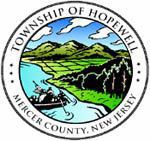Lea Kahn, Staff Writer
Taxes, development and sustainability – and how they would handle it – dominated the Hopewell Township Committee candidates forum sponsored by the League of Women Voters of Hopewell Valley.
The four candidates for township committee – Democratic Party Mayor Kevin Kuchinski and his running mate, Michael Ruger, and Republican Party candidates Luis Nicolao and Philip Volpe – outlined their positions at the Oct. 19 forum at the Municipal Building.
Noting that the school district tax makes up the largest portion of the property tax bill, the candidates were asked to share their views on the relationship between the Hopewell Valley Regional School District and township committee.
While Ruger and Volpe agreed that the committee has no control over the school district’s budget, Volpe said it would be helpful to create more sources of revenue and that he would look at the school district budget.
Ruger pointed out that Hopewell Township is assessed more money per student than Hopewell Borough and Pennington Borough as its share toward the budget, and promised to “work on it” if he is elected.
Kuchinski suggested looking at shared services between the school district and the township to reduce expenses. He also was concerned that the the township is paying more in property taxes per student than the two boroughs.
Turning to the topic of development and sewer extensions, all four agreed that sewer service should not be extended to areas of the township that do not have service now.
Kuchinski said that “in principle,” he would like to stop sewer expansions and to keep them out of “pristine areas” to discourage development.
On development, Nicolao and Volpe said the prospect of approximately 3,000 new housing units – which builders say are needed for them to provide 653 units of affordable housing – does not thrill them.
“We don’t want to add 3,000 more (housing units) in 10 years. We have to fight to keep Hopewell Township (the way it is),” Nicolao said.
But Ruger said there is no guarantee that 3,000 units would be built. It would be up to the developers to build the new units, and if there is no market, they likely would not be built.
And finally, asked how Township Committee could help residents to live more sustainably, Volpe and Kuchinski favored solar energy. Ruger focused on water conservation.
Nicolao said that while he, too, favors solar energy, it is not Township Committee’s responsibility to tell the residents how to live.

